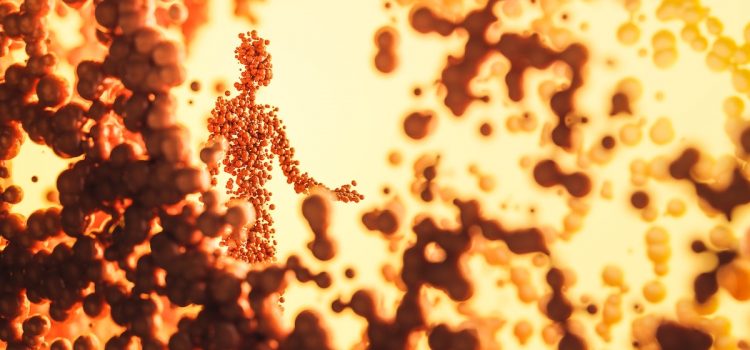

This article is an excerpt from the Shortform book guide to "Super Human" by Dave Asprey. Shortform has the world's best summaries and analyses of books you should be reading.
Like this article? Sign up for a free trial here.
What are free radicals? Do they benefit the body in any way?
Free radicals get a bad rap. And, much of that is deserved. However, they do benefit the body in some ways—specifically, regulating the heart and supporting the immune system.
Read more to learn about the benefits of free radicals.
What Are Free Radicals?
Before we get into the benefits of free radicals, let’s take a quick look at what free radicals are, how they’re created, and how they function in the body.
Mitochondria—tiny organelles that live within your cells—manage cellular health and functionality through a number of processes, including the extraction of energy from your body’s metabolic processes to power your cells. When extracting energy from your body’s metabolic processes, mitochondria create free radicals.
Free radicals are molecules that initiate a chemical reaction (oxidation) that damages the structure of your cells. When your mitochondria function efficiently, they create sufficient antioxidants to counteract the damaging effects of free radicals and keep your cells in prime condition.
Asprey explains that, when excess free radicals damage your cells, they inhibit a key mitochondrial process—removing dysfunctional cells from your body. These dysfunctional cells linger in your system, secreting inflammatory proteins that accumulate in your body and cause chronic inflammation, which makes you more susceptible to diseases.
Research appears to back up the idea that excess free radicals lead to chronic inflammation and various diseases due to a build-up of dysfunctional cells. However, that doesn’t mean that all free radicals and dysfunctional cells are detrimental and should be eliminated—having some of these substances in your body actually benefits your health in numerous ways.
The Benefits of Free Radicals
Free radicals play a significant role in regulating the heart: They stimulate cell contractions that help the heart pump blood throughout the body with the correct force. This means that eliminating free radicals from heart muscle cells would negatively alter the force of the contractions required to keep the heart and body healthy.
Free radicals help the immune system kill pathogens in the body: The immune system takes advantage of free radicals’ cell-damaging qualities by targeting them toward disease-causing organisms such as bacteria and viruses.
Dysfunctional cells support immune system functioning: The reason these cells release inflammatory proteins is to alert the immune system to their presence so they can be removed. Additionally, some of these cells also monitor tissues for injury and stimulate nearby stem cells to initiate repairs (by releasing inflammatory proteins). This means that, in some cases, removing these cells would slow down the body’s natural healing process.
| Free Radicals: Lonely Electrons Wanting to Feel Complete Research backs up Asprey’s description of the interplay among mitochondria, free radicals, and antioxidants. It also provides insights into how free radicals cause cellular damage and the role antioxidants play in preventing this damage. Free radicals are formed when molecules gain or lose electrons—resulting in incomplete molecules with unpaired electrons. (Think of a group of friends made up of two couples. One of the friends abandons the group, leaving three friends in the group—one couple and one single person.) The unpaired electrons from these incomplete molecules (the free radicals) then attract and pair with electrons from other, complete molecules——making these other molecules incomplete. (Think of the single person left in the group, feeling alone and jealous of the remaining couple. To avoid feeling left out, this single person steals a partner from another quartet of friends, leaving that group with one couple and one single person.) The process of unpaired electrons seeking out electrons to pair with sets off a chain reaction that alters and weakens the structure of multiple cells. (Think of how heartbroken and unstable all of these groups of friends are.) Antioxidants, on the other hand, don’t become unstable when they gain or lose electrons. This means that they can donate electrons to free radicals to make them complete and stable—which prevents the damaging chain reaction that weakens multiple cells. (Think of a dating service that seeks out singles and provides them with their perfect match without inflicting unnecessary drama.) |

———End of Preview———
Like what you just read? Read the rest of the world's best book summary and analysis of Dave Asprey's "Super Human" at Shortform.
Here's what you'll find in our full Super Human summary:
- How to grow older without the negative side effects
- A look into the advancements of anti-aging science
- Why a healthy future starts with making changes now






